
Journal of Technology and Chinese Language Teaching
Scope & Guideline
Harnessing Technology for Effective Chinese Teaching
Introduction
Aims and Scopes
- Integration of Technology in Language Teaching:
The journal publishes research on how various technologies, including online platforms, AI, and multimedia, can be effectively integrated into Chinese language teaching to improve learner engagement and outcomes. - Innovative Pedagogical Approaches:
It emphasizes novel pedagogical methods, such as project-based learning, total physical response, and gamification, that facilitate the teaching of Chinese as a second language (CSL) in diverse contexts. - Research on Learner Engagement and Motivation:
The journal highlights studies that focus on learner motivation, attitudes, and engagement strategies in online and hybrid learning environments for Chinese language learners. - Assessment and Evaluation Practices:
It covers research related to assessment techniques, including the use of rubrics and technology in evaluating language proficiency and writing skills among learners. - Cultural Education in Language Learning:
The journal also addresses the importance of cultural education within language instruction, exploring ways to integrate cultural components into the curriculum.
Trending and Emerging
- Artificial Intelligence and Language Learning:
The increasing use of AI technologies, such as ChatGPT, in language practices highlights a trend toward leveraging machine learning for personalized language instruction and assessment. - Online and Hybrid Learning Models:
The growth of research on asynchronous online discussions and remote synchronous learning strategies emphasizes the ongoing evolution of language teaching modalities in response to global educational challenges. - Data-Driven Learning and Assessment:
Studies focusing on learning data mining and intelligent recommendations indicate a shift towards using data analytics to enhance the learning experience and tailor assessments to student needs. - Cultural Exchange and Global Learning:
There is an emerging interest in virtual exchange programs that promote intercultural understanding within language learning, reflecting a broader trend towards globalized education. - Multimedia and Interactive Learning Tools:
The exploration of multimedia resources and interactive tools, such as digital games and visual aids, signifies a growing emphasis on creating engaging and effective learning environments.
Declining or Waning
- Traditional Classroom Instruction Methods:
Research focused on conventional teaching methods without technological integration is becoming less prominent, as educators increasingly seek innovative approaches to engage learners in a digital landscape. - Handwriting Instruction in Language Learning:
The emphasis on handwriting skills in Chinese language learning is waning, as studies show a shift towards typing and digital literacy, particularly among beginners. - Physical Classroom Dynamics:
There is a decreasing focus on traditional in-person classroom dynamics, as more studies explore online and hybrid learning environments, especially in the context of the COVID-19 pandemic.
Similar Journals
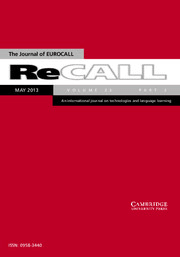
ReCALL
Elevating Discourse in Language Learning and TechnologyReCALL is a prestigious academic journal published by Cambridge University Press, focusing on the rapidly evolving interplay between technology and language learning. Established in 1989, this quarterly journal holds a distinguished Q1 ranking across multiple categories including Computer Science Applications, Education, and Linguistics and Language, reflecting its commitment to the highest standards of scholarly excellence. With an impressive Scopus ranking that places it in the top percentiles across its fields, ReCALL serves as a vital resource for researchers, educators, and professionals interested in the integration of technology in language education. It features cutting-edge research articles, innovative methodological approaches, and comprehensive reviews that offer insights into the current trends and future directions of language learning, teaching, and assessment. By providing a platform for penetrating inquiry and dialogue, ReCALL significantly enhances the discourse surrounding computer-assisted language learning (CALL) and its influence on educational practices worldwide.

Italiano LinguaDue
Advancing Knowledge in Italian Language StudiesItaliano LinguaDue is a leading journal dedicated to the exploration and study of the Italian language and its various facets. Published by Milano University Press, this journal provides an essential platform for academics, linguists, and language enthusiasts interested in the evolving dynamics of Italian linguistics, literature, and cultural studies. Since its transition to Open Access in 2009, it has broadened its reach, allowing researchers globally to share and disseminate their findings without the barriers of subscription fees. Although currently lacking an H-index and specific Scopus rankings, the journal remains committed to advancing scholarly discourse in its field, fostering a collaborative environment for publication among its contributors. By consistently publishing high-quality peer-reviewed articles, Italiano LinguaDue plays a vital role in enriching the academic landscape surrounding the Italian language, making it indispensable for researchers, professionals, and students alike.

Recherche et Pratiques Pedagogiques en Langues de Specialite-Cahiers de l Apliut
Cultivating Excellence in Specialized Language Education.Welcome to Recherche et Pratiques Pedagogiques en Langues de Specialite-Cahiers de l Apliut, a distinguished journal published by the ASSOC PROFESSEURS LANGUES IUT-APLIUT in France. Focused on the critical intersection of education and linguistics, this journal aims to disseminate innovative research and practices in the field of specialized languages and pedagogy. With its ISSN 2257-5405 and E-ISSN 2119-5242, it serves as a vital platform for educators, researchers, and students to explore effective teaching methodologies and language acquisition strategies. The journal has garnered recognition in various categories, currently ranked Q4 in Education and Q3 in Linguistics and Language for 2023, highlighting its emerging contribution to the field. Although it operates without an open access option, its focused studies and implications for educational practices ensure that critical insights are accessible to professionals seeking to enhance their understanding and application of language education. Join a community committed to advancing pedagogical approaches in specialized languages through the insights provided in this journal, bridging theoretical frameworks and practical applications from 2011 to 2019 and continuing from 2021 to 2024.
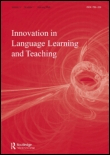
Innovation in Language Learning and Teaching
Transforming Language Education through Innovation.Innovation in Language Learning and Teaching is a premier peer-reviewed journal published by Routledge Journals, Taylor & Francis Ltd, focusing on the intersection of innovative practices in language education and teaching methodologies. With a notable impact factor reflected in its recent placement in the Q1 quartile for both Education and Linguistics and Language categories, this journal serves as a crucial resource for scholars and practitioners aiming to enhance pedagogical approaches and improve learning outcomes in language education. Spanning from 2009 to 2024, it showcases cutting-edge research that addresses contemporary challenges in the field, facilitating a deeper understanding of language acquisition, pedagogy, and curriculum development. The journal is indexed in Scopus, demonstrating its significant contribution to the academic community, with impressive ranks in both the Arts and Humanities as well as the Social Sciences categories. Although it follows a traditional subscription model, the journal is committed to disseminating high-quality research that fosters collaboration and discussion among researchers, educators, and students dedicated to advancing language learning and teaching practices.

Journal of Language Teaching and Learning
Enhancing Global Communication Through Language LearningJournal of Language Teaching and Learning, with ISSN 2146-1732, is a pivotal peer-reviewed publication dedicated to advancing the fields of language education and linguistics. Published by JOURNAL LANGUAGE TEACHING & LEARNING in Ankara, Turkiye, this journal aims to disseminate cutting-edge research, innovative teaching strategies, and critical analyses that serve the diverse needs of language teachers and learners globally. As an open-access journal, it is committed to providing unrestricted access to high-quality research, making it an invaluable resource for researchers, educators, and students alike. With a strong focus on promoting effective language acquisition and pedagogical practices, the Journal of Language Teaching and Learning holds an important space in the academic landscape, encouraging scholarly dialogue and collaboration in the pursuit of linguistic excellence.
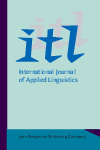
ITL-International Journal of Applied Linguistics
Exploring the dynamic intersection of language and pedagogy.ITL-International Journal of Applied Linguistics, published by JOHN BENJAMINS PUBLISHING CO in Belgium, stands as a leading journal in the field of applied linguistics and education, recognized for its rigorous scholarship and impactful contributions. With an impressive ranking of Q1 in both the Education and Linguistics and Language categories, ITL holds its place among the top journals globally, featuring in the Scopus rankings with a notable 91st percentile in both Arts and Humanities as well as Social Sciences. The journal aims to disseminate innovative research exploring the intersection of linguistics, language acquisition, and pedagogical practices, fostering a rich academic dialogue among researchers, educators, and practitioners. Though not currently an open access journal, ITL remains accessible to a broad readership, with an emphasis on high-quality, peer-reviewed articles that inform and inspire advancements in applied linguistics. The journal's commitment to academic excellence and relevance makes it an essential resource for those seeking to understand and contribute to the dynamic landscape of language studies.
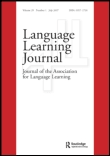
Language Learning Journal
Elevating research standards in linguistics and education.Welcome to the Language Learning Journal, a premier resource for researchers, educators, and linguists alike, published by Routledge Journals, Taylor & Francis Ltd. With a proud history dating back to 1990 and commitment to advancing the exploration of language acquisition, this esteemed journal boasts an impressive impact factor within Q1 rankings across both the Education and Linguistics and Language categories. Ranked #40 in Language and Linguistics and achieving a 96th percentile in the Arts and Humanities, the journal serves as a crucial platform for disseminating cutting-edge research, innovative methodologies, and impactful discussions in the field of language learning. Although currently not offered as an open access publication, the depth and quality of content ensure significant contributions to the body of knowledge for professionals and scholars. With its global reach, the Language Learning Journal is dedicated to fostering the development and understanding of language learning processes, enabling readers to stay informed about the latest trends and findings through rigorous peer-reviewed articles.

FOREIGN LANGUAGE ANNALS
Fostering Innovation in Language AcquisitionForeign Language Annals is a prestigious academic journal published by Wiley, dedicated to advancing the field of linguistics and language studies. Since its inception in 1967, the journal has established itself as a vital resource for researchers, professionals, and students interested in the evolving dynamics of foreign language education and acquisition. With an impressive impact factor that places it in the Q1 category for Linguistics and Language in 2023, Foreign Language Annals ranks 48th out of 1167 journals in its domain, showcasing its influence and reach within the scientific community. Through a diverse range of scholarly articles and research findings, the journal aims to foster innovation and best practices in language instruction and pedagogy. Although not open access, it remains accessible to a broad readership, offering invaluable insights for those striving to improve language education and understanding across cultures.

Language Learning in Higher Education
Transforming higher education through effective language learning.Language Learning in Higher Education is a prominent academic journal published by DE GRUYTER MOUTON, dedicated to exploring the intricate dynamics of language acquisition and pedagogical practices within the higher education context. With a robust ISSN: 2191-611X and E-ISSN: 2191-6128, this journal provides a platform for innovative research that addresses contemporary challenges and methodologies in language education. The journal enjoys a favorable reputation in the academic community, as evidenced by its ranks in the Scopus database, where it holds a position in the 67th percentile for Language and Linguistics and is classified in the Q3 and Q2 quartiles across relevant education and linguistics categories. Since its convergence in 2017, Language Learning in Higher Education aims to enrich scholarly discourse by publishing high-quality articles that foster insights into effective language learning strategies, thus serving as an essential resource for researchers, educators, and students committed to enhancing language education. The journal's editorial team is devoted to advancing the field through rigorous peer-review processes and welcomes contributions that push the boundaries of language learning research.
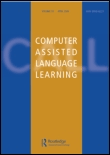
Computer Assisted Language Learning
Elevating Language Instruction with Innovative SolutionsComputer Assisted Language Learning is a prestigious journal dedicated to the interdisciplinary field of language education technology, published by Routledge Journals, Taylor & Francis Ltd. With its ISSN 0958-8221 and E-ISSN 1744-3210, the journal has become a cornerstone for researchers and practitioners interested in the innovative integration of computer technology in language learning processes. As of 2023, it holds an impressive impact factor, ranking Q1 in both Computer Science Applications and Linguistics and Language categories, indicating its significance within these scholarly domains. The journal covers a wide array of subjects, including language acquisition, educational technology, and instructional design, facilitating an understanding of how digital tools can enhance language learning experiences. Its rigorous editorial standards ensure that published articles undergo thorough peer review, making it a highly respected platform for disseminating cutting-edge research. With an extensive publication history dating back to 1990 and an ongoing commitment to exploring the dynamics of language learning in digital contexts, this journal is essential for academics, educators, and students alike who are looking to stay at the forefront of research in computer-assisted language education.